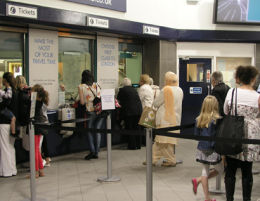Posted 14th August 2012 | 5 Comments
Protests grow at forthcoming rail fare increase

REGULATED rail fares on England are due to rise by an average of 6.2 per cent in January, the Government has confirmed. Fares will rise by an average of 4.2 per cent in Scotland and Wales.
Voices of protest have been raised today, including that of a county councillor who says he is seriously concerned about the effects of the rise.
The figure is based on the Retail Price Index in July, plus 3 per cent, which is a formula introduced by the present Government in 2010.
Ministers say they want to reduce the amount of railway funding which comes each year from taxpayers, and transfer more of the burden to passengers.
The last general increase, in January this year, was capped at RPI+1 per cent, but so far there is no indication that ministers are willing to follow suit for a second year running.
Demonstrations took place in London and other places today. The demonstrators have included the rail unions as well as transport campaigners, some of whom are calling for the railways to be renationalised.
Ellie Harris heads the Bring Back British Rail campaign, which has been demonstrating today alongside other campaign groups as well as the rail unions. She said: "In private ownership, passengers always have to play second fiddle to shareholders, knowing that the extortionate prices they are paying for tickets are not going towards improving the service, but are instead lining the pockets of a wealthy minority who do not even rely on the public transport system."
However, the Government says the extra money will reduce the share of railway cash which has to come from taxpayers, and that the forthcoming rises are not intended to boost the profits of train operators.
Although the figure has now been set, it will not apply uniformly to all regulated fares, which include season tickets. Operators are allowed to set lesser or greater increases to individual fares, so long as the official average is maintained over a 'basket' of fares.
Meanwhile, a Kent county councillor has said he is 'seriously concerned' about the effect of the rise.
Bryan Sweetland, who is Cabinet Member for Environment, Highways & Waste, said: “We recognise that the Government has decided to raise rail fares by the level of inflation + 3 per cent, and that this is not a decision taken by the rail operator, Southeastern. However, we are concerned at the serious impact this will have on families in Kent, at a time when household budgets are very tight.”
Mr Sweetland warned that some stations in Kent could see higher increases, as English operators are entitled to increase or decrease some regulated fares by a further 5 per cent, which could mean increases of up to 11.2 per cent for some next year.
He added: "“Any further increase on top of the proposed 6.2 per cent would be totally unacceptable. Kent County Council urges Southeastern not to impose any higher increases on top of the basic increase. We eventually want to see no increase in rail fares above the level of inflation.”
Reader Comments:
Views expressed in submitted comments are that of the author, and not necessarily shared by Railnews.

Jamie, Farnborough
Sign the Bring Back British Rail petition if you want to end this madness.
Melvyn Windebank, Canvey Island, Essex
Well you only get what you voted for!
Now lets demand the same formula used for rail fares be applied to fuel duty!!
Cameron boasts about saving a 1p on fuel duty while taking thousands in rail fare rises.
Its also time lorries paid a fair share to the costs of road maintenance and were not subsidized by railways!!!
MikeB, Liverpool
Agree with jak jaye. Don't forget, a big slice of extra revenue collected will also disappear into the state-owned coffers of DB, SNCF and NS, whose UK subsidiaries run an enormous chunk of our rail services. The Government must therefore legislate that all TOCs must commit themselves to ploughing money back into investment in stations and new trains. If they complain, they should be stripped of their franchises and eventually, the network re-nationalised along the lines of DB.
jak jaye, Leamington Spa
This is a disgrace,not one penny of the increase will go back into the railways.it will all end up in the bank accounts of those modern day highwaymen,First Goup and StageCoach,who make George Hudson(remember him?) look like a beginner,Bransons' well out of it
at least he doesn't have an army of MPs on his payroll,lobbying that useless waste of taxpayers money,Justine Greening
Lee, Manchester
presumably the increased fares paid to TOC's are intended to be used to pay the increased charges levied by Network Rail to pay for the infrastructure improvements such as electrification. I realise the fares increases are discretionary amongst operators and that they are not intended to increase dividends paid to share holders, but are there any legislative safeguards to actually stop that from happening? It does seem ironic that as we boldly head into what could be thought of as a triple-dip recession, the government wants to increase fares on services which certainly don't appear to have improved that much since the last fares increase. What 'improvements' have been made and by whom?